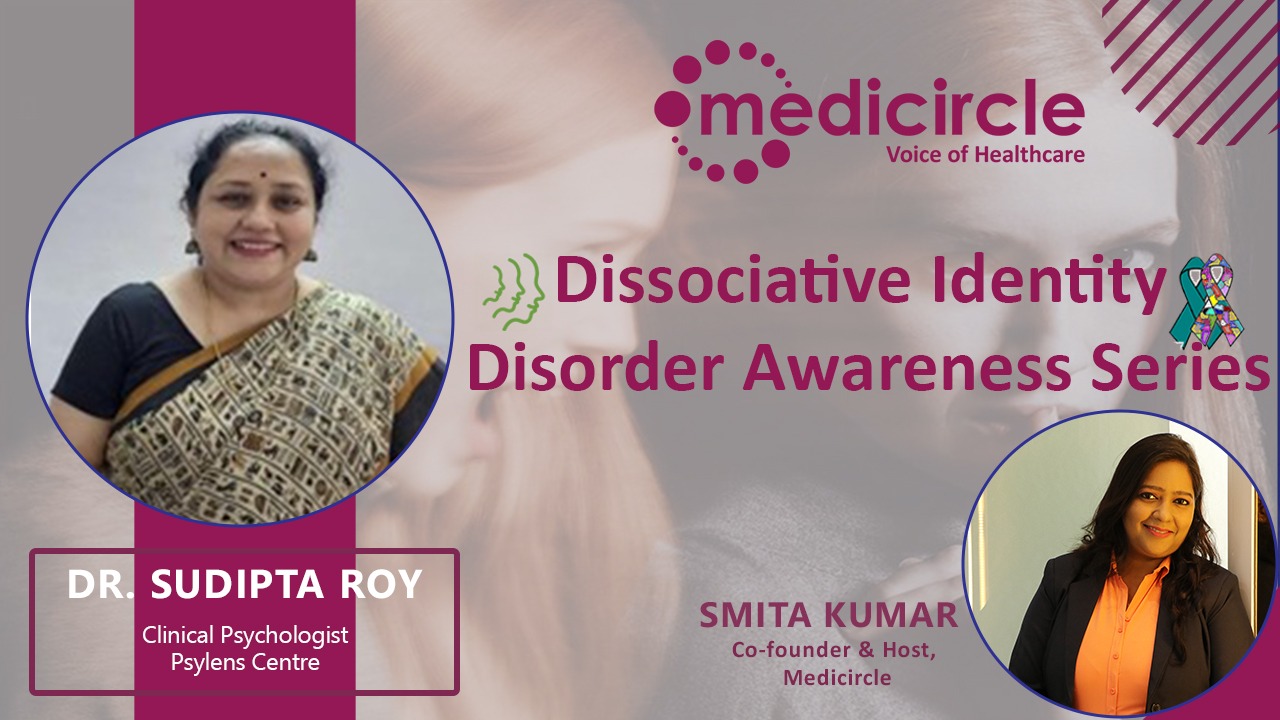Dissociative Identity Disorder (DID) was formerly called multiple personality disorder. People with DID develop one or more alternative personalities that function with or without awareness of the person's usual personality. This disorder often goes undiagnosed among the general population. Medicircle presents Dissociative Identity Disorder Awareness Series featuring eminent clinical psychologists, psychiatrists, and psychoanalysts to spread knowledge about it and help bring about understanding and compassion towards people suffering from it.
Dr. Sudipta Roy is an RCI, registered clinical psychologist working in this field for the last 25 years. She has extensive teaching, research, and clinical experience. As a highly skilled and trained clinical psychologist. She is completely devoted to helping people understand and resolve their concerns psychologically. She's a Guru to several students and has changed the lives of clients, students, and co-workers in several ways for the better.
Work Upon the Trauma for Healing
Dr. Sudipta advises, “Usually one of the first criteria to identify a dissociative identity disorder is that the person would be unaware of his/her other identity. Therefore, healing oneself in this condition becomes rather difficult. Because if you are not conscious of what's happening with you, then the chances of actually trying to deal with it yourself become very limited. But once a professional can bring it to light that you do have a dissociative identity disorder, then from there the healing can begin through self-healing as well as professional healing. Working upon the trauma is one of the first important steps towards healing in dissociative identity disorder,” says Sudipta.
Preventive Measures for Children – Accept and Confront Tough Emotions
Dr. Sudipta mentions that there is a lot that can be done to prevent this kind of disorder in children and lists down the following measures:
“1. First and foremost, the children need to be aware of their emotional states. They need to be able to accept and give voice to their emotions, and then they need to learn how to regulate them.
2. The second important thing that one has to learn to tolerate negative emotions. This is something that not just children, even adults find difficulty in. We think that negative emotion is intolerable and we don't enjoy it. The discomfort is so powerful that we just want to run away from that emotion. Running away is something that leads to dissociation. So, if we confront those tough emotions, and learn how to be with them, then we are in a better position to avoid this condition,” says Dr. Sudipta.
Remove Secondary Gains to Allow the Person to Heal
Dr. Sudipta emphasizes, “In our society people dissociated for short periods is the most common presentation of DID. In our culture, people with DID are welcomed and treated like gods and goddesses and are worshipped in the state of their dissociation. This is like a secondary gain. Due to this, it’s difficult for people around them and the person who's going through it to accept that disorder has a psychological basis and not some supernatural phenomenon. If we remove the secondary gain, these episodes would start reducing. People who are suffering from it would understand that this is a disorder and that they can get out of it by handling it effectively,” says Dr. Sudipta.
Tips for Family Members to Handle People with DID
Dr. Sudipta suggests:
“1. Define the problem correctly to the person suffering from it. It’s not that a spirit has entered the body rather the problem is of psychological trauma or distress, which is leading to a disconnect between the mind and behavior or the emotions and behavior.
2. Just leave the person in a safe place and detach yourself for a while. After some time, you will find that the person will recover on his / her own. His/her brain will not shut down forever. It will be only temporary. So, do not worry about it. Do not get manipulated by them.
3. Do not fall prey to giving them whatever they ask for during that episode.
4. Seek a professional because you can't sort this out on your own. You would need to go to a psychologist or a psychiatrist for the best help,” says Dr. Sudipta.
Role of Amygdala in Dissociative Identity Disorder
Dr. Sudipta explains, “People suffering from it should understand that there is a mind and body connection and how it works. There is an area of the brain called the amygdala. Whenever the emotions are too high, the area of the brain (amygdala) shuts down. So, you need to work on keeping the amygdala to remain very calm so that it doesn't sense danger around. If it is, in a calm state of mind, it won't shut down and this dissociative episode won't happen. Understand this and help people deal with it,” advises Dr. Sudipta.
(Edited by Amrita Priya)

 Dr. Sudipta Roy, Clinical Psychologist provides valuable inputs on how to deal with and help people suffering from Dissociative Identity Disorders so that they get into the path of healing.
Dr. Sudipta Roy, Clinical Psychologist provides valuable inputs on how to deal with and help people suffering from Dissociative Identity Disorders so that they get into the path of healing.










.jpeg)


.jpg)





.jpeg)

.jpg)





.png)


